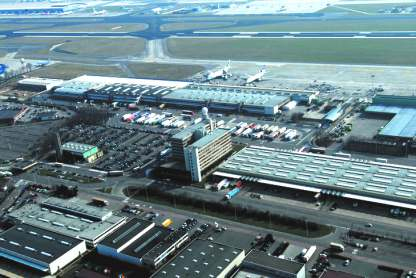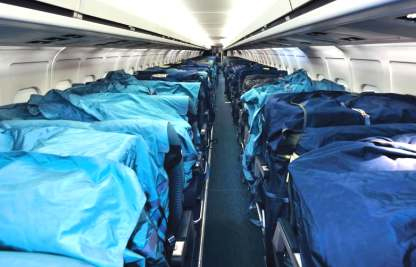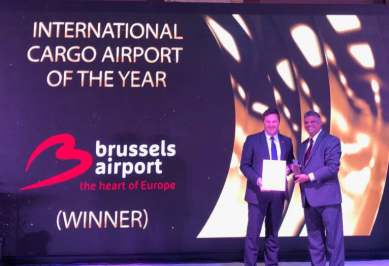What's next for the air cargo industry after bridging the gap during the pandemic?
On top of speed and operational excellence, one of the strengths of our industry is our professionalism and the great people who are part of the air cargo family. I am glad this crisis has revealed the air cargo heroes and hope this will not be forgotten.
Q&A with TIACA Chairman Steven Polmans
No one could have predicted that an unknown, invisible virus would shut the world for months, bury people and businesses in debt as well as cripple robust industries and economies in unimaginable proportions.
The Coronavirus pandemic is a tragic part of modern history that will be looked back upon with great sadness. It killed more than 900,000 people and infected nearly 28 million worldwide, thus far; millions have lost their jobs and billions across the planet still live in uncertain times.
The story doesn’t definitely end there. The pandemic remains a threat to all of us and certain industries like air cargo must double its efforts to step up to the plate and keep things going.
 Steven Polmans, Chairman of The International Air Cargo Association (TIACA), the only global trade organization for the industry, shares his insights with Air Cargo Update, the industry’s growing importance to sustain lives, businesses and economies during these difficult times.
Steven Polmans, Chairman of The International Air Cargo Association (TIACA), the only global trade organization for the industry, shares his insights with Air Cargo Update, the industry’s growing importance to sustain lives, businesses and economies during these difficult times.
One of the industry’s most crucial missions is to deliver billions of COVID vaccines once it gets the green light for distribution.
Worldwide, at least 578 drugs and vaccines are reportedly in development targeting the virus. 34 of these are now in final clinical evaluation with the global biopharmaceutical industry innovating and fast-tracking everything.
Approximately 12-15 billion doses of the vaccines are needed, but there’s no assurance that much could be produced immediately given the manufacturers’ limited facilities and resources. Some vaccines may require just one dose, others up to three doses, requiring more production and shipments, according to experts.
The air cargo industry, which has shown its agility, flexibility, reliability and innovation during the pandemic, is crucial in hauling the vaccines around the world. Is it ready? The honest answer is not yet but it’s up to the challenge.
Read the rest of our interview with Polmans, who is also the Brussels Airport Director for Cargo & Logistics and Chairman of Air Cargo Belgium.
It’s been widely circulated in the industry that you’ve decided to leave Brussels Airport as Director Cargo and Logistics. What prompted this decision and what’s next for a man of your caliber who is known for growing Brussels’ cargo business and pushing for the industry’s agenda in general.
The past 10 years were remarkable, and with my team, we have been able to really turn the cargo business in Brussels into a success story. Increasing revenue and profitability, complete overhaul of the infrastructure, setting up a cargo community, digitization initiatives to make Brussels the smartest airport. So, I can only say I look back at this period with great pride and positive feelings.
But after 10 years, I also felt I needed something new, something challenging, pushing me a bit out of my comfort zone again. So, we were able to end my contract in good terms and I am really looking forward to what comes next. It is the first time in my life I am not having a job, so it is also new to me. Hopefully, however it will be in this industry as I really like it and I feel there is still so much that can be done and where I believe I could contribute.
You’ve been the Chairman of TIACA very recently but its membership has remarkably grown with strategic alliances with some industry groups. How did you do this? What can you say about this feat?
As the unique not-for-profit industry association representing and uniting the global air cargo community, we believe it is important to ensure our membership is diverse in terms of stakeholder type, company size, geographic location. Since last September, we did several things to increase the membership of TIACA:
We signed a partnership with Neutral Air Partner (NAP), a premier global network of 250 leading air cargo architects and aviation specialists from 150 countries, making all NAP members also TIACA members.
We introduced a separate category for small, medium and start-up companies allowing them to become a full TIACA member at reduced rate, as we believe it is the mission of TIACA to represent and unite the global air cargo industry, regardless of the size of the company and welcoming new entrants.
We launched the Sustainability program last year and project Sunrays this year, as a start to morph TIACA into a content-driven association. This evolution is attractive to companies who want to contribute to such initiatives.
Regrettably, as the industry is suffering and many companies are struggling to survive, we are also losing some members due to the COVID-19 crisis.
The Coronavirus pandemic has exposed vulnerabilities & strengths in certain industries. Please relate those weaknesses and strengths in the air cargo industry.
Weaknesses of our industry were already known: fragmented, complex procedures, slow digitalization, complexity in the certification and use of active monitoring devices, lack of clear visibility of existing capabilities of airfreight players at each location or by trade-lane.
 We “discovered” at the start of the crisis our extreme reliance on passenger traffic to provide airfreight capacity. Capacity shortage was not an issue before, except at very peak times linked to Christmas and Single Days, but it is anticipated to be one of the major issues in the next months and years, until belly capacity is back.
We “discovered” at the start of the crisis our extreme reliance on passenger traffic to provide airfreight capacity. Capacity shortage was not an issue before, except at very peak times linked to Christmas and Single Days, but it is anticipated to be one of the major issues in the next months and years, until belly capacity is back.
On top of speed and operational excellence, one of the strengths of our industry is our professionalism and the great people who are part of the air cargo family. I am glad this crisis has revealed the air cargo heroes and hope this will not be forgotten
Another strength, despite opposite perception, is our great innovative mindset: airlines, handlers, airports, civil aviation authorities, manufacturers have all came up with solutions to the problems. The new “preighter” operations, Cargo in the Cabin, new equipment design to support them like Cargo Chute from JBT are prime examples of exceptional reactivity and solution-oriented approach we have in our industry.
What are the greatest challenges impacting the global air cargo industry’s growth and transformation in the digital age?
In the COVID-19 era, this is airfreight capacity, cash shortage and budget cuts affecting investments in infrastructure, both physical and digital. Before COVID-19, it was the slow pace of digital transformation mainly due to mindset and lack of priority given to cargo compared to passenger or to air compared to surface modes of transport.
In the post-COVID-19 era, we are hopeful that the profile of air cargo will be raised and heads of cargo will be invited more and heard better at Board discussions, that talented professionals will be willing to join and stay in this industry and drive its digital and sustainable transformation.
TIACA’s influence in the air transport industry is getting stronger as its responsibilities to safety transport vital goods across the world gets bigger. How is TIACA taking its role in this difficult and challenging times?
While the world is discovering air cargo’s vital role for a sustainable world, it is important for industry associations like TIACA to build on it and make the voice of our industry heard more and better.
TIACA is more relevant than ever in this context and to prepare the “next normal” as we are the only international trade association representing and uniting the global air cargo community.
TIACA’s challenge is to pursue its advocacy mission to defend the interests of our members and the industry, but also to set the vision for the future, building on strong partnerships, and developing products and services our members need now and will need tomorrow. We have to be visionary and pragmatic at the same time: this is our commitment to our members.
How do you help members adopt to the new normal, particularly those with no access to government assistance?
We are not yet in the new normal, times are still very uncertain. For a lot of smaller companies, this is having a bigger impact than for global companies with more support functions. Especially for those companies, joining a bigger alliance or association such as TIACA can help. We do have government contacts and access to other organization.
In recent months, several times, we were able to help individual members struggling to get their issues on the agenda of governments and authorities. When dealing with this crisis, decisions were taken that impacted passenger traffic but indirectly also cargo, often unknown or without realizing the impact. TIACA can help to create awareness and push to have cargo higher on the agenda.
There’s been plenty of talks a COVID vaccine is likely to be distributed for commercial use very soon. How prepared is the air cargo industry in undertaking this great task in your opinion?
The industry is not prepared yet, as we lack critical information of the future vaccines specifications, production locations, volumes, etc. But we are working on that.
Last month, TIACA joined forces with Pharma.Aero to launch project Sunrays. Our objective is to open dialogue with pharmaceutical manufacturers to collect these insights, as well as to gather intelligence on airfreight industry’s overall capabilities, plans and readiness to handle, store, transport and deliver the future vaccines.
What advice would you give air cargo carriers and logistics companies running cold chain facilities to efficiently handle this mission with billions of vaccines out to be distributed globally?
I am sure they are already doing it, but in case they are not, I would recommend they start discussing with their forwarders and pharmaceutical shippers now, do an inventory of their capabilities (in terms of skills/trained personnel; cool chain facilities, ground service equipment, ULDs, tracking devices, etc.), develop dedicated operating procedures to handle, store, transport and deliver the vaccines; set up dedicated teams; define what to do with the other cargo requests and manage customers expectations to avoid frustration, etc.
Air transport in developed nations are reliable but some remote areas as well as those facing civil and political unrest don’t have access to it. Is TIACA considering talks with international bodies to help in this area? Why or why not?
Yes, as much as possible, we would like to cooperate with international organizations like WHO, GAVI or UNICEF and share with them the intelligence we will gather. Our ambition is do ourselves what we are best in, and support others and join forces if it makes sense.
Please share some lessons we all could learn from this pandemic.
Still a bit early, as this pandemic is not over yet. We are not back to the new normal and I am also sure that seen the impact on (passenger) aviation on which we depend a lot, the future will look different.
But looking back, I think we must be very proud as an industry on what we did. We have shown agility, flexibility, determination, action and solution focused thinking. But all the weaknesses of the past are not gone: for me the biggest lesson is that this slow adoption of digitization, the lack of cooperation are things we need to tackle soonest.
Steven Polmans: Man of the Hour
 Steven Polmans spent most of his career in the world of aviation and held management positions, both operational and commercial, in the handling industry.
Steven Polmans spent most of his career in the world of aviation and held management positions, both operational and commercial, in the handling industry.
On October 1, 2010, he joined Brussels Airport as Cargo Marketing Manager and on February 1st, 2012, he was appointed Head of Cargo and Logistics, responsible for developing and implementing the overall cargo strategy of the airport.
In 2016, Steven became one of the founding fathers of Air Cargo Belgium and was chosen to become the first chairman of this newly established air cargo organisation at BRUcargo, grouping all stakeholders involved.
In August of the same year, Steven also joined the board of TIACA, The International Air Cargo Association, of which he became Vice Chairman in October 2017. On April 1st, Steven was promoted to Director Cargo & Logistics and amongst his new responsibilities is becoming in-charge of all cargo real estate development and portfolio management.
In July 2019, Steven took over the role of Chairman at TIACA, a position he still holds today.


